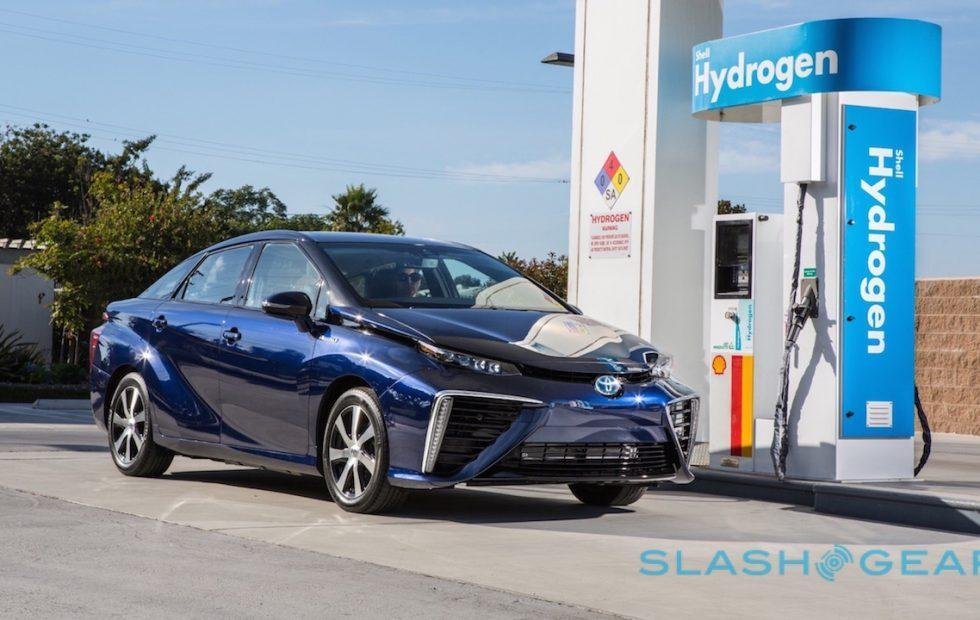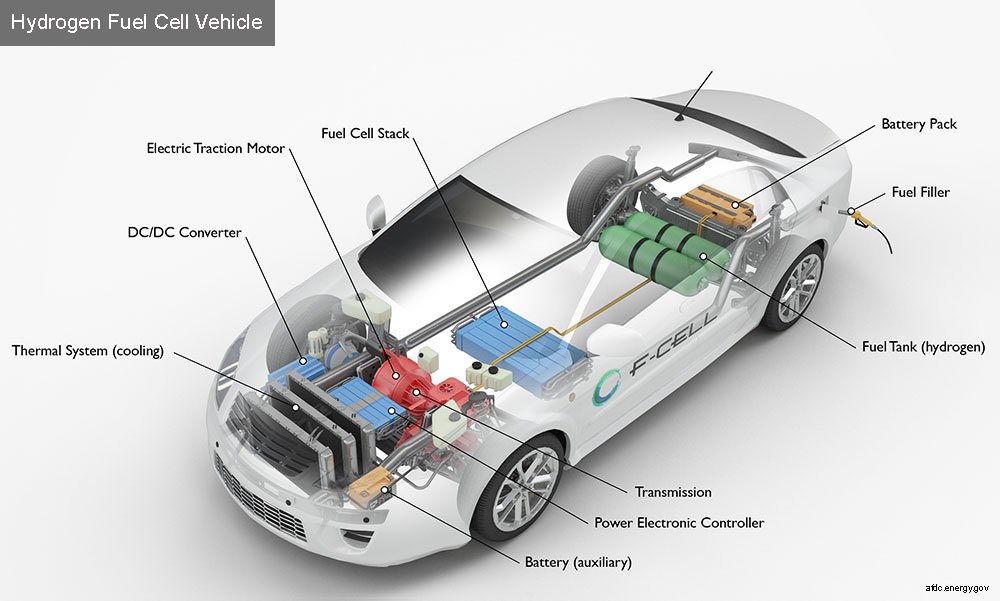Hydrogen Car-Green energy | Say no to electric cars: Technology rules over the world and is building its empire more significant and more prominent. Nowadays, technology is being upgraded and improved day by day. But technology is one of the biggest reasons for destroying our environment.
The environment plays a vital role in our life. But the pollution is increasing at a faster rate. Vehicles are the most crucial reason for creating pollution. Fuel-powered cars emit harmful gases such as carbon dioxide, carbon monoxide, etc. These are greenhouse gases that trap the sun’s heat and keeps the earth’s surface warm. The amount of carbon dioxide is increasing rapidly, which is causing global warming and depleting the ozone layer. The temperature of the earth’s surface has risen by 1.5%.
On the other hand, it is very sophisticated to dispose of the batteries of electric vehicles. These batteries are destroying our environment. So, to overcome these problems, the hydrogen car is introduced. Let’s know about the hydrogen car.
See also: Theory of relativity | What is time travel and is time travel possible?
Table of Contents
Hydrogen car

You might not know that apart from electric vehicles, new technology is going to be adopted all over the world, which will overtake electric cars. So, keeping in mind the problems mentioned above, hydrogen vehicles are being invented.
Hydrogen car uses green energy and is a zero-emission vehicle. The advantage of this car is that it is an environment-friendly car and doesn’t create pollution. It doesn’t emit any harmful gases. As the electric vehicle causes battery pollution and fuel-powered vehicles cause air pollution, you will be shocked to know that it excretes water from its exhaust. It is said that the water discharged is pure and drinkable.
You might not know that one kilogram of hydrogen can generate three times more power than petrol or diesel car and can generate 236 times more electricity than a one-kilogram lithium-ion battery.
See also: Flying Car – Flying Car Technology and Prototypes
Safety
The safety of a vehicle is the most important priority of a company. Hydrogen is a highly flammable gas. It needs to be stored and handled carefully in the hydrogen vehicle. So, the company should research adequately and undergo necessary tests before introducing the hydrogen car in the market.

Cost
The essential task of every company is to determine the price of its products. The maintenance cost and other service costs of the hydrogen car should also be less. The minimum amount of a hydrogen car would be higher than a conventional vehicle and will be around $40,000 and can be as high as 2 million dollars. Toyota is also selling a Hydrogen Fuel Cell Car for $50,000
See also: Bloodhound | Fastest Car in the World
Environment
Fuel-powered vehicles emit harmful gases and cause air pollution. It is very tough to dispose of the batteries of the electric car. So, keeping in mind the above problems, the hydrogen car is introduced.
A hydrogen car is an environment-friendly vehicle; it is a zero-emission vehicle. It does not emit any harmful greenhouse gases such as CO2, CO, CH4, etc and gives out only water and heat as waste through the exhaust. The company says that wastewater is pure and can be drunk by us.
How do Hydrogen Cars Work

We have learned a lot about hydrogen cars; the question would have stuck in everyone’s mind, how do hydrogen cars work? The hydrogen fuel cell is a device that makes a car move, which converts the hydrogen into electricity. The battery is the main problem in an electric car; on the contrary, there is no battery in the hydrogen car because power is not stored, whereas, it is produced in hydrogen fuel cells.
See also: Top 12 World’s Fastest Aircraft that talk to the sky
A hydrogen fuel cell comprises a cathode, an anode, and an electrolyte membrane. On the other hand, the electrolyte membrane is made up of a ceramic layer.
Hydrogen and oxygen pass through the hydrogen fuel cell to generate electricity, which drives the motor of the hydrogen car and emits heat and pure water as waste. Hydrogen is a renewable resource, not like fuel, which is a non-renewable resource. It is an everlasting resource. Thus, it can be said as a future fuel.
How is hydrogen produced?
Hydrogen is not present in its raw form in nature. So, it is produced through a chemical process. There are many methods to produce hydrogen. We will be talking about the two most popular ways to obtain hydrogen. The methods used in producing hydrogen are the following:
- Separating hydrogen from water: This method is popularly known as electrolysis, hydrogen is separated from the water. This process requires electrical energy.
- Converting natural gas: This is the safest method used to obtain hydrogen. Natural gas is directly applied to power hydrogen car engines.
Currently, 96% of the hydrogen is obtained by converting natural gas or fossil fuel, and 4% is achieved through electrolysis.
See also: Top 7 Fastest Manmade Things in the World
Benefits of hydrogen cars
Reduced greenhouse gas emissions
A hydrogen car is a zero-emission vehicle. It doesn’t emit any harmful greenhouse gases; it gives off only water and heat as waste. With the increase in demand for hydrogen cars, demand for fuel-powered vehicles will tend to diminish. So, it will cause a reduction in the number of greenhouse gases in the atmosphere.
Reduced demand for foreign oil
With the increase in demand for hydrogen cars, the need for foreign oil will reduce because fuel-powered vehicles will be used very less. So, the oil will be imported less from foreign countries.
See also: Top 12 Fastest Land Animals in the World
Environment-friendly
Hydrogen car does not have any adverse impact on the environment as it doesn’t emit any harmful greenhouse gases; it only emits heat and pure water, which can be drunk.
It does not carry any batteries like an electric car and doesn’t store electricity because it produces energy through the hydrogen fuel cell. Hence, hydrogen vehicle can be said as an environment-friendly vehicle.
Energy Efficiency
Fuel-powered or electric vehicles operate with an efficiency of not more than 25%, whereas hydrogen vehicles can be around 80% efficient. One kilogram of hydrogen is three times more potent than a fuel-powered or electric car.
Are hydrogen fuel cell cars to be used in the future?
The answer may be no. According to me, hydrogen cars will not be used in the future because of the following drawbacks of the hydrogen car:
Cons of the hydrogen car
Few service stations
There are only a few hydrogen service stations because many companies are still working on hydrogen vehicles.
See also: Top 7 Superfast and High-speed trains in India
Flammable gas
Hydrogen is a highly flammable gas. So, it needs to be handled and stored carefully.
Expensive gas
Although it is available in large quantities, it’s a costly gas because separating hydrogen from water is an expensive process.
Difficulty in transportation and storage
It is a sophisticated task to transport and store hydrogen because it is a flammable gas.
What companies are currently working on hydrogen vehicles?
Some of the companies working on hydrogen cars are as follows:
Toyota Mirai

Toyota Mirai can drive for around 312 miles after fuelling it. It costs $50,000. A total of 836 units were sold in California since it’s launched and is planning to sell 30,000 units worldwide in 2022.
See also: Top 10 Fastest Cars in the World – Both Official and Unofficial
Honda Clarity

Honda Clarity can drive for 360 miles after fuelling it. It costs around $37520.
BMW
BMW is working on a hydrogen car and would be starting in 2022. It says that its hydrogen car would drive around 300 miles after fuelling it. It can be refueled in less than five minutes.
BMW is also planning to partner with Toyota to manufacture hydrogen trains in 2022.
Audi h-Tron Quattro

Audi h-Tron Quattro can drive for 372 miles per hour after fuelling it and can accelerate from 0 to 62 miles per hour in 7.1 seconds.
Hyundai Nexo

Hyundai Nexo can generate a maximum power of 120 KW and reach a maximum speed of 179 kph.
What countries are currently working on hydrogen vehicles?
- America is planning to build near about 200 hydrogen filling stations in California by 2025.
- China and Japan will produce more than one million hydrogen cars by 2030. On the other hand, South Korea is also planning to build approximately 8.5 million hydrogen vehicles by 2030.
- Germany is always one step ahead among other countries in means of technology. It has already produced a hydrogen train, which can generate a maximum speed of 87.5 mph / 140 kph.
Hydrogen car vs Electric car
Hydrogen car vs Electric car: Let’s make out a difference between the hydrogen car and electric car.

- You must have known much about hydrogen cars. So, let’s make out a difference between the hydrogen car and electric cars.
- A hydrogen car is an environment-friendly vehicle, whereas the electric vehicle harms the environment. A hydrogen car is a zero-emission vehicle, it gives out water and heat as waste, but the batteries of the electric vehicle is very sophisticated to be disposed of.
- The hydrogen car is more energy-efficient as compared to the electric vehicle because it generates three times more power than a fuel-powered or electric vehicle. A hydrogen car is around 80% efficient, whereas the electric vehicle is 25% efficient.
- An electric car is less expensive as compared to the hydrogen car.
Why are electric cars bad for the environment?
So, to avoid air pollution, electric cars were invented. We think electric cars don’t create pollution as it doesn’t emit harmful gases. But, it does create pollution, not air pollution, it creates chemical pollution. It is very sophisticated to dispose of those big batteries used in electric cars.
I am not against electric vehicles; I am telling the disadvantages of electric vehicles. We should not forget that it does not matter what type of battery is used; it will undoubtedly damage our environment in the future. And, within the next few years, battery pollution is going to take place on earth.
The electric vehicles seem to be eco-friendly and zero-emission vehicles. Still, in India, fossil fuels are used to generate 70% of the electricity to charge them that release a large amount of CO2.
In India, 90% of the waste is recycled and disposed of by the informal sector.
Conclusion
I am not against electric cars; I want to bring awareness about electric vehicles among people. If we are not willing to stop using electric cars, then some strict laws need to be made for the recycling of batteries.
In India, more than 2 million e-waste is produced every year. But, only 20% of the waste could be recycled. The rest of the waste is either burnt or buried in the ground.
So, we should look into this problem and should bring this new technology as a mass phenomenon. We will stop using fuel-powered and electric cars and will start using hydrogen cars when produced. If a hydrogen vehicle arrives in all countries, the earth can become heaven once again.
I hope you have liked this article related to the hydrogen car and will share it with your friends.
